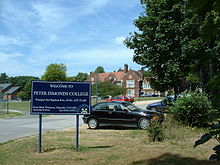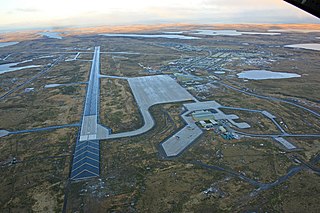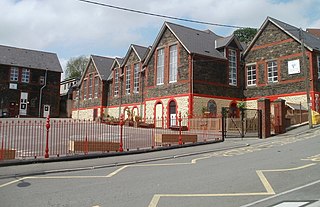This article needs additional citations for verification .(August 2014) |

Education in the Falkland Islands starts with childcare for babies, all the way to lifelong learning for adults. It broadly follows the English education system.
This article needs additional citations for verification .(August 2014) |

Education in the Falkland Islands starts with childcare for babies, all the way to lifelong learning for adults. It broadly follows the English education system.
The Infant and Junior School and Camp Education teach 3 to 11 years olds (Foundation Stage to Year 6). The Infant and Junior School is in central Stanley and is a 2 form entry primary school. Camp Education has 2 rural schools in Fox Bay Village and in Goose Green, both schools have a full-time teacher who teaches children in a mixed-age group. Children, up to Year 5, who are living at farms which are too far from either Stanley or settlement schools are taught by travelling teachers and by phone lessons with a teacher.
The Falkland Islands Community School caters for ages 11 to 16. Older children can board in a hostel in Stanley so they can attend school there. [1]
All teachers are trained in the UK or other English-speaking countries. There is also a primary school at RAF Mount Pleasant that mainly serves the children of members of the British armed forces. [2] Some primary aged children who live in "camp" (the local term for the countryside) are educated remotely. In 2021 this Camp Education system celebrated its 125th anniversary. [3] [4]

There are no post-secondary institutions on the Falklands, and therefore post-secondary studies would require travel to the UK or beyond. The Falkland Islands Government pays for qualified 16- to 18-year-olds to go overseas to study. Typically until recent years students went to England to take A-level courses at Peter Symonds College, Winchester, England (which houses a Falkland Islands funded boarding house named Falkland Lodge) [5] or to attend Chichester College to acquire National Diplomas or NVQs. [1] In 2005 principal Neil Hopkins described the college as "the official sixth-form college for the Falkland Islands". [6] . In recent years fewer students have attended Peter Symonds, and it has become more common for students to choose other schools and colleges, usually in the UK but also in Gibraltar and in New Zealand. Students receive funding from Falkland Islands Government if they have a minimum of five GCSE passes at grade 4 or higher.
The government also funds higher and further education courses for over-18s, also usually in the UK, for suitably qualified students.
Almost all return to the Falkland Islands after they have completed their education and gained experience in their chosen field. [7]
There is a small adult education college and training centre in Stanley, called Falkland College. It moved into a new building during 2020. It offers vocational courses, including via distance learning. [8] [9] The college includes a library called the Christie Community Library.
The Falkland Islands currently has three primary means of transport - road, sea and air. However, in 1946, when Sir Miles Clifford arrived as governor, there were no air services, no roads outside Stanley and an indifferent sea service. Sir Miles was instrumental in starting the Falkland Islands Government Air Service in December 1948. The inaugural flight involved a mercy flight from North Arm Settlement to Stanley to bring a girl with peritonitis to life-saving medical help in Stanley. There is now an international airport, a domestic airport, a number of airstrips, a growing road network and a much-improved ferry service between the two main islands.

The Falkland Islands are a British overseas territory and, as such, rely on the United Kingdom for the guarantee of their security. The other UK territories in the South Atlantic, South Georgia and the South Sandwich Islands, fall under the protection of British Forces South Atlantic Islands (BFSAI), formerly known as British Forces Falkland Islands (BFFI), which includes commitments from the British Army, Royal Air Force and Royal Navy. They are headed by the Commander, British Forces South Atlantic Islands (CBFSAI), a brigadier-equivalent appointment that rotates among all three services.

A student is a person enrolled in a school or other educational institution.

Stanley is the capital city of the Falkland Islands. It is located on the island of East Falkland, on a north-facing slope in one of the wettest parts of the islands. At the 2016 census, the city had a population of 2,460. The entire population of the Falkland Islands was 3,398 on Census Day on 9 October 2016.

Peter Symonds College is a sixth form college in Winchester, Hampshire, in the south of England. Founded as a boys' grammar school, it is one of the few specialist sixth form colleges which is also a boarding school. It serves Falkland Islands residents for sixth form. It is the biggest sixth form college in the UK.

RAF Mount Pleasant is a Royal Air Force station in the British Overseas Territory of the Falkland Islands. The airfield goes by the motto of "Defend the right" and is part of the British Forces South Atlantic Islands (BFSAI). Home to between 1,000 and 2,000 British military personnel, it is about 33 miles (53 km) southwest of Stanley, the capital of the Falklands—on the island of East Falkland. The world's longest corridor, 2,600 feet (800 m) long, links the barracks, messes, and recreational and welfare areas of the station, and was nicknamed the "Death Star Corridor" by personnel.
Education in England is overseen by the Department for Education. Local government authorities are responsible for implementing policy for public education and state-funded schools at a local level. State-funded schools may be selective grammar schools or non-selective comprehensive schools. All state schools are subject to assessment and inspection by the government department Ofsted. England also has private schools and home education; legally, parents may choose to educate their children by any suitable means.

An infant school is a term used primarily in England and Wales, for the education of children between the ages of four and seven years. It is usually a small school serving a particular area. It is sometimes a department in a larger primary school educating children up to the age of approximately eleven years old.
Education in the Republic of Ireland is a primary, secondary and higher education. In recent years further education has grown immensely with 51% of working age adults having completed higher education by 2020. Growth in the economy since the 1960s has driven much of the change in the education system. For universities there are student service fees, which students are required to pay on registration, to cover examinations, insurance and registration costs.

Goose Green is a settlement in Lafonia on East Falkland in the Falkland Islands. It lies on Choiseul Sound, on the east side of the island's central isthmus, 2 miles (3.2 km) south-southwest of Darwin. With a population of about 40, it is the third-largest settlement of the Falkland Islands, after Stanley and Mount Pleasant.

A sixth form college is an educational institution, where students aged 16 to 19 study typically for advanced post-school level qualifications such as A Levels, Business and Technology Education Council level 3 (BTEC), and the International Baccalaureate Diploma, or school-level qualifications such as General Certificate of Secondary Education (GCSE) examinations and BTEC level 2 qualifications. In many countries this type of educational institute is known as a junior college. The municipal government of the city of Paris uses the phrase 'sixth form college' as the English name for a lycée.
Spinifex State College is a public, co-educational, day and boarding school located in Mount Isa, Queensland. It first opened in 2003.

The Falkland Islands is an archipelago in the South Atlantic Ocean on the Patagonian Shelf. The principal islands are about 300 mi (480 km) east of South America's southern Patagonian coast and about 752 mi (1,210 km) from Cape Dubouzet at the northern tip of the Antarctic Peninsula, at a latitude of about 52°S. The archipelago, with an area of 4,700 sq mi (12,000 km2), comprises East Falkland, West Falkland, and 776 smaller islands. As a British overseas territory, the Falklands have internal self-governance, but the United Kingdom takes responsibility for their defence and foreign affairs. The capital and largest settlement is Stanley on East Falkland.

Western-style education was introduced to Bhutan during the reign of Ugyen Wangchuck (1907–26). Until the 1950s, the only formal education available to Bhutanese students, except for private schools in Ha and Bumthang, was through Buddhist monasteries. In the 1950s, several private secular schools were established without government support, and several others were established in major district towns with government backing. By the late 1950s, there were twenty-nine government and thirty private primary schools, but only about 2,500 children were enrolled. Secondary education was available only in India. Eventually, the private schools were taken under government supervision to raise the quality of education provided. Although some primary schools in remote areas had to be closed because of low attendance, the most significant modern developments in education came during the period of the First Development Plan (1961–66), when some 108 schools were operating and 15,000 students were enrolled.

Service Children's Education (SCE) is an organisation of the United Kingdom government responsible for the education of the children of British Armed Forces families and Ministry of Defence (MoD) personnel serving outside of the United Kingdom. They provide schools and educational support services from Foundation Stage through to sixth form. They are headquartered at Trenchard Lines, Upavon, Wiltshire.

Phyllis Mary Rendell is a Falkland Islands politician who served as a Member of the Legislative Assembly for the Camp constituency from 2013 to 2017.
Stacy John Bragger is a Falkland Island journalist and politician who has served as a Member of the Legislative Assembly for the Stanley constituency since the 2017 general election.

Falkland Islands Community School (FICS) is an 11–16 mixed secondary school in Stanley, Falkland Islands. It was established in 1992 and shares its site with the Falkland Islands Leisure Centre.

The COVID-19 pandemic in the Falkland Islands is part of the worldwide pandemic of coronavirus disease 2019 caused by severe acute respiratory syndrome coronavirus 2. The virus was confirmed to be in the islands on 3 April 2020. During the first wave, the number of cases peaked at 13, with all being from the military base at Mount Pleasant leaving none from the general population. All 13 patients recovered. On 10 November, a new case was discovered. As of 4 May 2022 a total of 195 people were confirmed to have been infected.